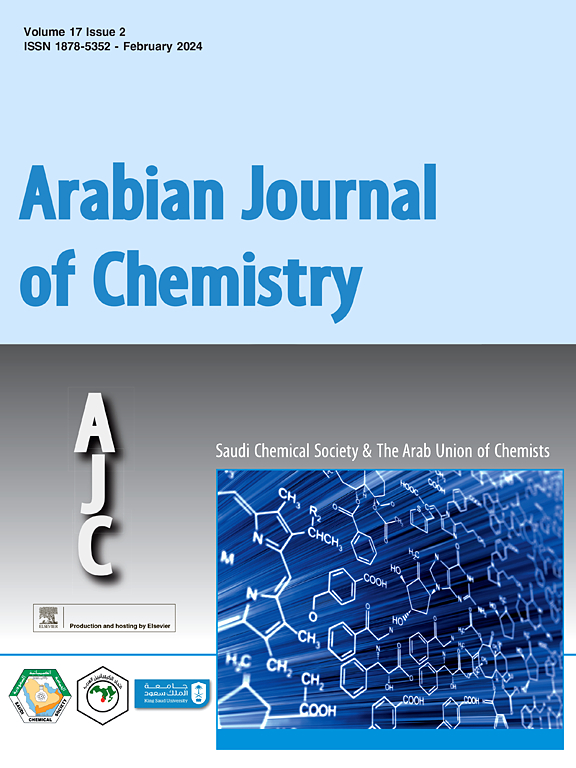β-Sitosterol ameliorates the cognitive deficits and neuropathological hallmarks in an Alzheimer’s disease model
IF 5.2
2区 化学
Q2 CHEMISTRY, MULTIDISCIPLINARY
引用次数: 0
Abstract
Alzheimer’s disease is a neurodegenerative condition causing cognitive decline. Aluminum chloride (AlCl3) is a neurotoxin linked to oxidative stress and neurodegenerative disorders. In light of inadequate current treatments, there is an urgent need for more approaches to treat Alzheimer’s disease. β-sitosterol, a phytosterol found in grape skin, fern, and red wine, has potential health benefits. This research aims to assess its preventive impact on AlCl3-induced Alzheimer’s disease. The animals were divided into five groups: Group I (control), Group II (AlCl3 70 mg/kg), Group III (Rivastigmine 2.3 mg/kg), and Groups IV and V (β-sitosterol 50 and 100 mg/kg with AlCl3). AlCl3 was administered from days 5–25, treatments from 26–42 days, and behavioral parameters were measured on days 5, 16, 26, and 42, after which brain samples were collected for the estimation level of oxidative stress, cholinergic function, Glycogen synthase kinase-3β, Rho kinase, Lipoxygenase-5, TNF-α, COX-2, and Na+K+ATPase expression and activity. The β-sitosterol prevented cognitive impairment caused by AlCl3 via the reduction of oxidative stress, the improvement of cholinergic function, and the suppression of Glycogen synthase kinase-3β, Rho kinase, Lipoxygenase-5, TNF-α, COX-2, and Na+K+ATPase expression and activity. In silico studies demonstrated the strong affinity of β-sitosterol towards Alzheimer’s disease biomarkers, confirming their function in preventing and regulating its pathogenesis. Consequently, the findings point out that β-sitosterol has an anti-Alzheimer’s ability by reducing the toxicity caused by AlCl3.
β-谷甾醇改善阿尔茨海默病模型中的认知缺陷和神经病理特征
阿尔茨海默病是一种神经退行性疾病,会导致认知能力下降。氯化铝(AlCl3)是一种与氧化应激和神经退行性疾病有关的神经毒素。鉴于目前治疗方法的不足,迫切需要更多的方法来治疗阿尔茨海默病。β-谷甾醇是一种存在于葡萄皮、蕨类植物和红酒中的植物甾醇,具有潜在的健康益处。本研究旨在评估其对alcl3诱导的阿尔茨海默病的预防作用。将实验动物分为5组:ⅰ组(对照组)、ⅱ组(AlCl3 70 mg/kg)、ⅲ组(利瓦斯汀2.3 mg/kg)、ⅳ组和ⅴ组(β-谷甾醇50和100 mg/kg加AlCl3)。第5 - 25天给予AlCl3,第26 - 42天给予AlCl3,第5、16、26和42天测量行为参数,之后收集脑样本,评估氧化应激水平、胆碱能功能、糖原合成酶激酶-3β、Rho激酶、脂氧合酶-5、TNF-α、COX-2和Na+K+ atp酶的表达和活性。β-谷甾醇通过降低氧化应激、改善胆碱能功能、抑制糖原合成酶激酶-3β、Rho激酶、脂氧合酶-5、TNF-α、COX-2和Na+K+ atp酶的表达和活性来预防AlCl3所致的认知功能障碍。计算机研究表明,β-谷甾醇对阿尔茨海默病生物标志物具有很强的亲和力,证实了它们在预防和调节其发病机制中的作用。因此,研究结果指出β-谷甾醇通过降低AlCl3引起的毒性而具有抗阿尔茨海默氏症的能力。
本文章由计算机程序翻译,如有差异,请以英文原文为准。
求助全文
约1分钟内获得全文
求助全文
来源期刊

Arabian Journal of Chemistry
CHEMISTRY, MULTIDISCIPLINARY-
CiteScore
10.80
自引率
3.30%
发文量
763
审稿时长
63 days
期刊介绍:
The Arabian Journal of Chemistry is an English language, peer-reviewed scholarly publication in the area of chemistry. The Arabian Journal of Chemistry publishes original papers, reviews and short reports on, but not limited to: inorganic, physical, organic, analytical and biochemistry.
The Arabian Journal of Chemistry is issued by the Arab Union of Chemists and is published by King Saud University together with the Saudi Chemical Society in collaboration with Elsevier and is edited by an international group of eminent researchers.
 求助内容:
求助内容: 应助结果提醒方式:
应助结果提醒方式:


